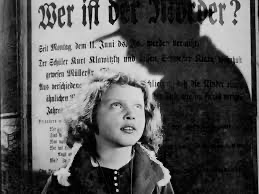YouTube viewing
Fritz Lang left his native Germany in 1933 to escape the Nazis (Joseph Goebbels had offered him a job as a studio head) and three years later, worked in Hollywood, where he made such films as The Big Heat, Clash By Night, Scarlet Street, and many more in a career that lasted into the 60s. Prior to all of that, he was a successful filmmaker back home as well, and for a long time, he worked with a collaborator who was a vital part of that success—his wife.
Thea von Harbou was a novelist turned screenwriter. She met Lang while working on an adaptation of one of her novels in 1918, which led to an affair. In 1920 she divorced her husband and married Lang two years later. During the 20s, she worked not only with Lang but other filmmakers, including FW Murnau and Carl Theodor Dreyer. In 1927 she adapted for the screen her novel Metropolis. (Lang did some uncredited work as well, but the screen credit belongs solely to her.)
TVH would divorce Lang in 1933 due to him having multiple affairs. That was the year Hitler came to power in Germany and regrettably, she supported the Nazis. However, she also went on to directing a few films and writing many more—plus she spoke out publicly in favor of women’s right to abortion.
In 1931, Lang and TVH made their first sound motion picture, M. Germany had tried to develop sound for years prior to the American breakthrough film The Jazz Singer in 1927. Sound would come to German films successfully two years later.
In M, there are totally silent sections of the film which I initially mistook as a mistake in the print before I realized it was intentional on Lang’s part: for instance, when Peter Lorre is chased through the city streets, that sequence is shot without sound. I’m not sure what, if anything, it’s meant to signify, but in retrospect, it does feel like a choice.
What particularly struck me about this film is how Lang depicted a society willing to sacrifice liberty in the name of security. The local police go to extraordinary lengths to uncover Lorre’s child murderer character Beckert, and of course, ordinary people are quick to suspect each other based on circumstantial evidence. Not that the cops shouldn’t have turned over every stone to look for Beckert, but watching this film was like reliving the George W. Bush years.
M looks more self-assured visually than many early sound films, especially those that were concerned with placing the actors close to the hidden microphones. Lang’s DP was Fritz Arno Wagner. Lang was part of the German Expressionist movement, of which Metropolis was a part, as well as other silent masterpieces like The Cabinet of Dr. Caligari and Nosferatu. While M is set in a recognizable real world, Lang uses things like shadows and reflections to convey the sense of dread that accompanies Lorre.
This was Lorre’s film debut, and what a way to kickstart a career. The former Laszlo Lowenstein got his start on the Viennese stage at 17 and moved around between Germany and Switzerland during the 20s. He appeared in the plays of Bertolt Brecht. Lang had Lorre in mind as the killer from the start. His performance led to a bigger part in Hitchcock’s original The Man Who Knew Too Much, in which Lorre learned his English-language role phonetically. The rest was history.
Last fall, Joker got a lot of people’s panties in a bunch because they thought the enigmatic comic book serial killer was given an origin that almost excused his actions, blaming society for the way he was. I disagree, but why did he even need an origin to begin with? (Billion dollar gross aside.) Beckert in M didn’t need one and he is no less unsettling and creepy for the lack of it.
I think it’s something within us that needs to explain the unexplainable, to make sense of it, when sometimes there just isn’t an easy answer. Beckert says in the climax of M there was something inside him that made him prey on children (girls? We don’t know for sure he stalked boys) that he couldn’t control. That was good enough for 1931 audiences, but times, to say the least, have changed.





When I saw M for the first time I anticipated a difficult watch due to subject matter, to its being foreign and the early sound techniques. None of that proved to be true. Instead, I was impressed by Lang's ability to sweep me into the story, by the humour in the interactions between the crooks and the cops, without sacrificing the horror and the heartbreak. It is a great movie.
ReplyDeleteLang implies more than he shows, and I think that’s why it’s not that hard to sit through. I was gonna call Lorre’s character a rapist, but then it occurred to me that based on what we see, we don’t have proof of that, and he probably wasn’t (though he was bad enough as he was).
ReplyDeleteLike you said, this was certainly a grand way to kickstart Peter Lorre's acting career. He is the perfect casting choice.
ReplyDeleteI liked what you said about origin stories. Lorre's character didn't have one, and the movie doesn't suffer as a result.
Maybe origin stories of familiar characters is a trend that’ll die down after awhile. Dunno.
ReplyDeleteTo carry over from my comment on a previous post, this movie was the last club event I attended in the good ol' days. I really enjoyed this one, too. Metropolis is one of my favorite movies, and I was interested to see something else from Lang. I think the quiet that dominates the film makes the whistling tune extra creepy.
ReplyDeleteGood point. This early talkie was surprisingly crafty in its use of sound.
ReplyDelete